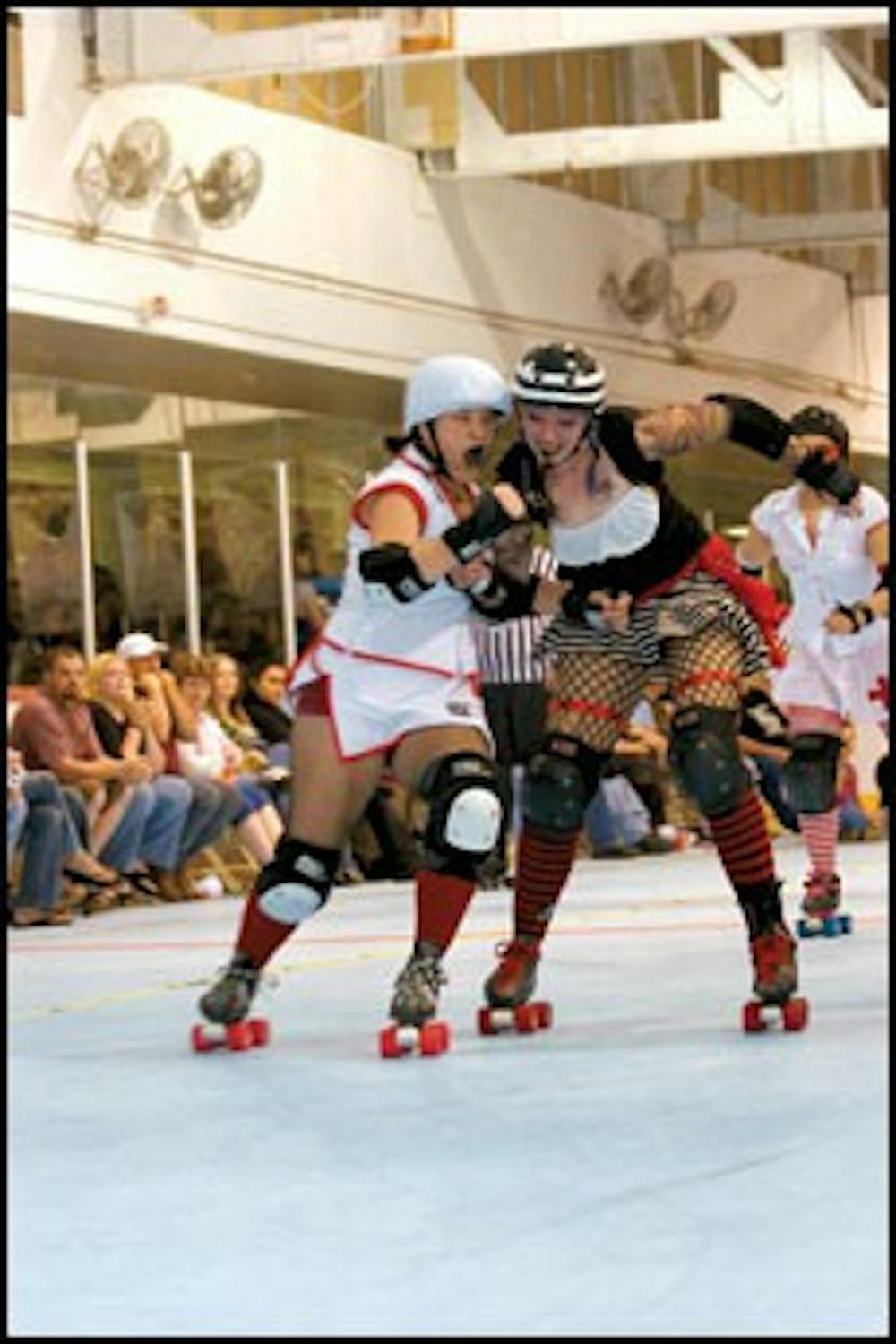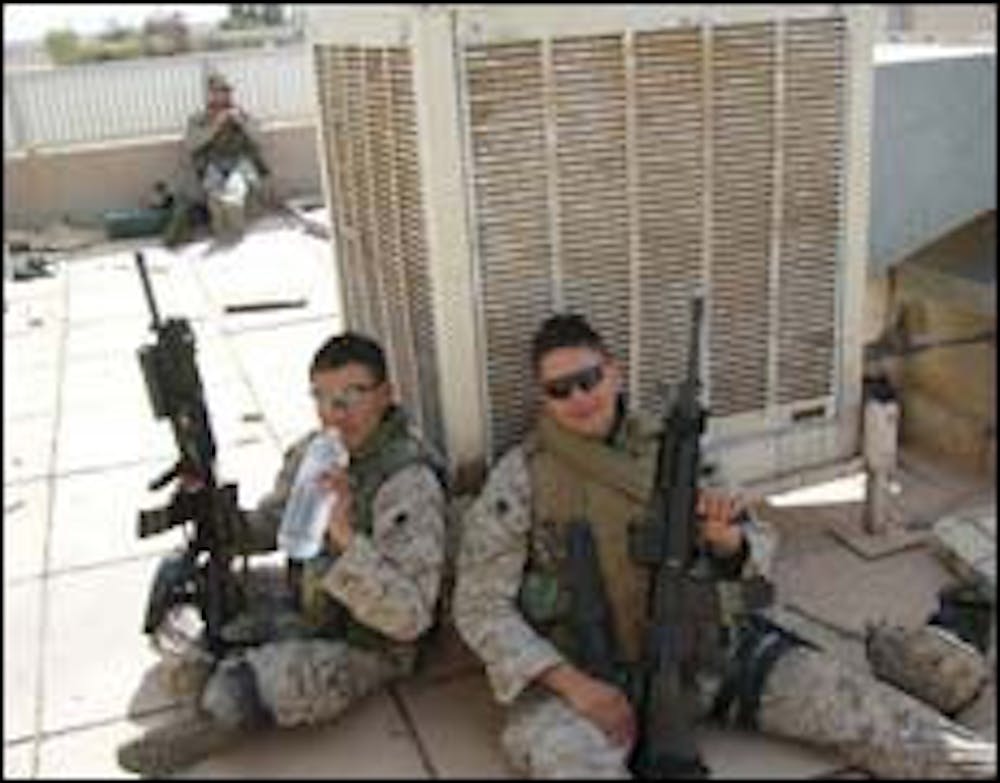John, 22, and Cheston, 21, Bailon share a bond only brothers have. They finish each other's sentences, yet can communicate without words. The pair, both veterans of the current war in Iraq and corporals in the Marine Corps Reserve, have done everything together since childhood -- climbing mountains, attending the same schools and sharing the same dream of joining the military.
Theirs is a bond not even the horrors of war or distance from their desert home could destroy.
The brothers grew up on the Navajo Indian Reservation in Shiprock, N.M., and they say they never fought with each other. Sibling rivalry doesn't exist for these two -- their Navajo religion and culture taught them only to respect and love each other. Their special bond deepened even further in March 2005, when the brothers, who enlisted in the military together four years earlier, were deployed to Iraq for seven months, where they served in the 3rd Battalion, 25th Marine Regiment as infantrymen. They got lucky -- normally the military doesn't allow brothers to serve in the same unit.
Upon their safe return home last October, the brothers were greeted by Navajo Nation President Joe Shirley, Shiprock town leaders, family members and friends. While they were moved to see so many friendly faces at their homecoming, they say they most welcomed the chance to meet and reminisce with other Navajo veterans of the Korean War, Vietnam War and World War II.
"It's a bond built in combat," says Cheston. "They understand where we're coming from and what we're dealing with."
Looking Out for Each Other
The brothers say they were first in their bloodline to join the military. John says that he remembers that growing up their father told them ancient war stories and taught them the importance of protecting their sacred land.
According to history professor Peter Iverson in his book "Dine: A History of the Navajos," Navajos believe they are surrounded by sacred land. When the Japanese attacked Pearl Harbor in World War II, Iverson says Navajos wanted to take part in protecting American land that was sacred to them.
Within the first year of the war, 1,400 Navajos had joined the armed forces, including 350 volunteers.
During World War II, Iverson says, the American military was in need of an effective code to use in the Pacific and the Navajo language was presented as an option. The Navajo language was a code that could be transmitted very fast and the Japanese never broke it.
During the first 48 hours of the attack on Iwo Jima, Japan, the code talkers sent 800 messages without error, says Iverson. According to Iverson, the Marines would have never captured Iwo Jima -- a battle crucial to the American victory -- without the code talkers.
Cheston says that he remembers a conversation at a family reunion between a World War II code talker veteran and another family friend. The veteran said he wanted to help the military because when the Japanese attacked American soil, they attacked everything American, including his tribe.
Cheston says that he felt the same way as that veteran during the 2001 terrorist attacks. But the brothers say that Sept. 11 wasn't the only reason they joined the military.
"My loyalty [to America] was before 9/11," Cheston says. "Ever since I was nine years old I had a dream. I always knew something is going to happen like that, so I was like, 'You know what? If you look through history every generation has its own little war."
The brothers say the idea of joining the military was always present while growing up. John says that initially he wanted to attend West Point Military Academy and then go to officer candidate school. But Cheston had other ideas.
"If war happens, I didn't want to be an officer that is not experienced and lead men in the wrong direction. I wanted to go and enlist in an officer school," says Cheston.
With this thought in mind, Cheston joined the Marine Corps Reserves two weeks after he turned 17. Because he was a minor, he had to convince his parents to sign for him.
Cheston says that his parents, especially his mother, were shocked when he told them that he wanted to enlist. He says he told his parents that he was joining no matter what, saying, "Let me join now. Or I can wait until I'm 18. I am going to join either way."
John found out from his mother over the phone that Cheston joined the military. At first he was upset and worried, thinking his younger brother would neglect school due to military duty. He calmed down after hearing Cheston joined the Marine Corps Reserves, meaning he could go to school after boot camp.
John, a biochemistry major, wasn't thinking about joining his brother until he received a call from Cheston after his first semester at ASU. Cheston persuaded him to join the military by mentioning the ranger's school, a specially trained elite unit, something John was interested in. He says he was even happier to learn he could still attend ASU between trainings, meaning he could still pursue his dream of becoming a doctor.
When their mother found out that John had enlisted too, she experienced another shock. This time, John says he calmed her down with a promise that they would look out for each other during boot camp.
At the Front Line
As soon as the brothers found out they were going to Iraq, John says their family started preparations for the traditional Navajo prayers performed before going to war. According to Navajo legend, the war prayers started with Changing Woman -- the granddaughter of the first human being on earth, who was impregnated by the Sun and gave birth to twin boys. When the boys grew up, monsters invaded the earth and started a war. Before the boys joined the fight, they received the warrior's prayers before they went to kill the monsters, says Cheston.
The Bailon brothers received the same prayers. The warrior prayers lasted for four days. After the warrior prayers came holiness prayers for another four days, where the brothers were forbidden to think or do things considered "bad," such as cutting meat or digging holes. The brothers say that the prayers prepared them for what they were about to face in war and served as protection from harm.
It was a tough period for both of them, says John. They were trying to finish their finals at ASU, while at the same time dealing with heavy training and participating in the traditional prayers. Deployment snuck up on them -- before they knew it, they were on their way to Iraq.
They landed in Kuwait, and as soon as their company was stationed in Haditha Dam, Iraq, the brothers, belonging to different platoons, were sent on separate missions. John was sent to train the Iraqi National Guard at Camp Hit and Cheston went into combat right away. They were separated for three months -- the longest they have ever been apart. They say they were constantly worried about each other and that only prayers and faith kept them believing that they would see each other again.
"You couldn't believe it. It was crazy," John says. "Stressful times, a lot of prayers."
Cheston remembers that the Marines from Ohio that he served with were at first skeptical of his praying rituals.
"They asked me, 'What are you doing, crazy Indian over there by himself, what's that smell, some kind of weed?' But by the end of the deployment they didn't bother me at all, we all became like brothers," says Cheston.
There were four other Navajos in Cheston's platoon and he says hanging out and spending time with them helped him a lot.
After long and exhausting missions that lasted for weeks, the Marines got at least one day off where they would all split up and do their own things, says Cheston. Some would take out their DVD players or head to the Internet labs. Cheston spent his spare time hanging out with the other Navajos, especially Sgt. Jonathan McKenzie, who was also from Shiprock. On their days off they talked about home, shared memories and discussed the war and what they were going to do when they returned home.
John says he remembers every ambush and every face of a fallen Marine that was with him in combat. On Mother's Day, Cheston remembers, they had a nine-and-a-half-hour-long battle and lost four Marines.
"That's a horrible thing to have a son killed on Mother's Day. Three days later we lost four other Marines," he says.
Their colonel told them that by July, they were the most combat-engaged unit since the Vietnam War, says Cheston.
"In my opinion, we need more troops over there, because we were exhausted," says Cheston. "Sometimes we were so tired that our performance would be horrible."
Their company of 150 came back with 24 casualties.
Coming home
Upon returning home, they say they were received with a traditional Navajo cleansing ceremony -- a ritual to rid their bodies of everything they saw and smelled and to calm the fears that built up while they were at war. They say the ritual helped them deal with post-traumatic stress, though they still have dreams about being ambushed or attacked.
A clinical social worker at ASU's counseling and consultation, Paul Rock Krech, says that he sees how strong cultural ties can help people with post-traumatic stress. Krech is an Ojibwe -- also called Chippewa -- Indian from White Earth, Minn., and says he sees parallels between his culture and the Navajo's culture. He says that despite traditional ceremonies changing over time, they are still crucial to his tribe.
"Healing ceremonies are a very important part and source of strength [for Ojibwe] and hopefully they'll continue to be," says Krech.
Enjoying their mom's home-cooked meals during the winter break, John and Cheston were eager to return to their normal daily lives. John was excited to see his girlfriend while Cheston was more than thrilled to be back at ASU to pursue his business marketing degree. He wants to go to a law school somewhere in the eastern U.S. once he is done with his undergraduate studies.
"I am a geek," says Cheston with a grin.
They both joke that they lost some brain cells over in Iraq.
"We laugh about this all the time, we can't spell right anymore, our e-mails started to sound horrible," they say.
While there's a chance the brothers could re-deploy to Iraq in January 2007, for now they want to focus on school, watching football in their spare time and raising money for the library in their hometown.
"We don't regret ever going to Iraq. Would we do it again?" Cheston says, "I don't know."
Reach the reporter at ljiljana. ciric@asu.edu.







